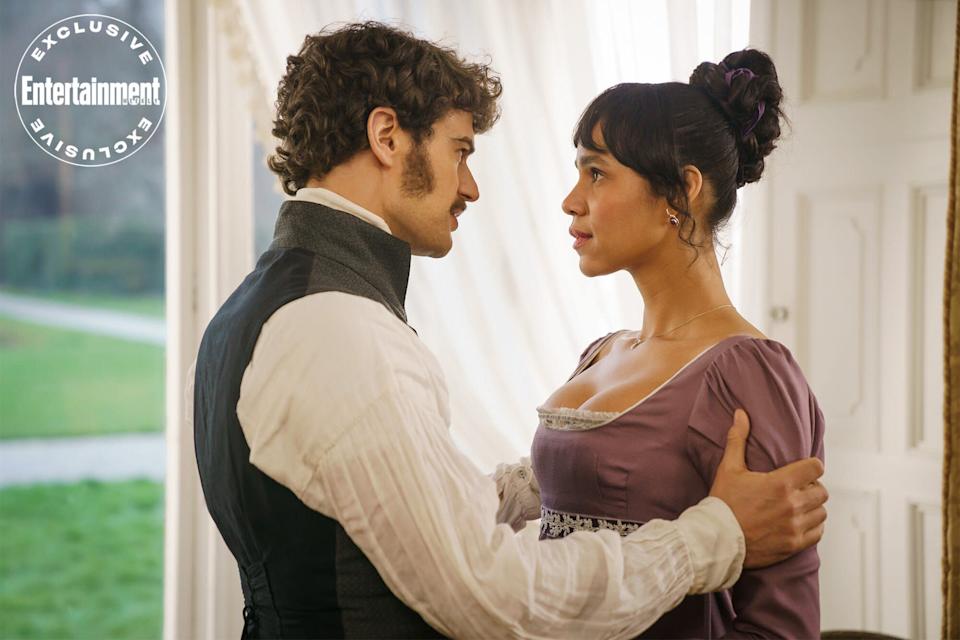

It is a truth universally acknowledged that audiences simply cannot get enough of beautiful people in corsets falling in love.
If you’ve already binge-watched Bridgerton season 2 multiple times, there’s a new Regency confection on its way to sate your desire for more historical romance. Mr. Malcolm’s List, based on the book by Suzanne Allain (who also wrote the screenplay), follows Julia Thistlewaite (Zawe Ashton), who is jilted by London’s most eligible bachelor, Mr. Malcolm (Ṣọpẹ́ Dìrísù) after failing to meet every item on his list of requirements for a bride.
Deadset on revenge, Julia convinces her friend, Selina Dalton (Freida Pinto), to pretend to be his ideal match. But will Mr. Malcolm be able to suss out if he’s met the perfect woman…or just a perfect hoax?
The film, directed by Emma Holly Jones in her feature debut, pairs frothy contemporary rom-com vibes with the wit and lush landscapes of a Jane Austen novel. EW has an exclusive look at Ashton in the film getting cozy with Theo James (The Time Traveler’s Wife) as Captain Henry Ossory (Sanditon fans, get excited to see James in breeches again).
We talked to Jones about why she was determined to cast diversely, why she’s always dreamed of making an Austen-esque period film, and the unexpected ways in which Hamilton inspired her process. Read more after the trailer below and catch Mr. Malcolm’s List in theaters on July 1.
[embedded content]
ENTERTAINMENT WEEKLY: So, this book was optioned before it was published, and the author wrote the screenplay. Walk me through all of that.
EMMA HOLLY JONES: It’s the most backwards tale. Because it was 17 or 18 years ago that Suzanne Allain wrote the book, but it was self published. Years later, she decided to turn Mr. Malcolm’s List into a screenplay. And she sent it to The Blacklist. They decided to do a podcast reading, as part of a table read series they were doing, of Mr. Malcolm’s List. So I listened to that podcast. I didn’t read the script first; I heard it while driving my car. And I very quickly fell in love with it and the concept of it, and I called Suzanne’s agency. I had a very specific idea for how I would take something like Suzanne’s material and what I wanted to turn it into, and I went in and made that pitch and the rest is history.
Obviously, as a first-time feature filmmaker saying, “I want to do a period rom-com,” the task of trying to sell that film is quite a lot because there’s a lot of people out there who don’t necessarily think that first-time directors should be doing big period pieces, which I can understand. I knew that was going to be an issue. So, [my producers and I] decided that we had to make some sort of proof of concept. At the time, Refinery29 had this Shatterbox short film series for women directors, and we submitted it to them. They financed the short film version of Mr. Malcolm’s List, which sort of acts as an overture, trailer, whatever you want to call it. It’s on YouTube now. They really gave us the resources we needed to do it. It was that proof of concept and that short film that got the novel published. The success of the short enabled Suzanne’s book, 16 years later, to be actually published, which is really cool. We had the book and the short and then we ran out there and got the money to make the big one. It’s been seven years in total from when I heard the script.
What was it like having an author adapt their own novel?
I fell in love with it from the screenplay version. I didn’t get to read the book until way into the short film. So I actually fell in love with it in script format first, and then, when we were in the process, I was very clear about wanting to develop the story in certain ways for the cast that we had. During the short film, we created new characters, so I created the footman. I really wanted to inject my sense of humor. It’s been a real labor of love from both Suzanne and me. She’s been incredible at allowing me to come in and open up the world and inject film-esque qualities to it.
Female friendship was something that Freida and I, since the short film, were both really adamant that we wanted to develop in the material and flesh out that storyline. I wanted it to relate to a modern audience through its sense of humor, but also through the souls of the characters. I didn’t want these girls to feel dated. I wanted them to feel contemporary in who they were, so it’s been a huge development process from start to finish. The film is actually very different than the book in a number of ways now, but that’s a good thing because that’s what directors are meant to do — to come in and bring it off the page and bring it into 2022.


Ross Ferguson/Bleecker Street ‘Mr. Malcolm’s List’
Before Bridgerton, we hadn’t really seen adaptations in this era cast people of color. Did that series inspire any casting choices? Why was that important to you?
The short film was shot in 2018 and came out in February 2019. They all pre-dated Bridgerton. None of us had heard the word Bridgerton when we started developing the film this way. Obviously, the success of Bridgerton has not hurt Malcolm’s trajectory in finding an audience.
For me, it came down to two really simple things. The week that I heard the screenplay for the first time, I was in New York and I went to see Hamilton. I’ve watched every British period drama like 1,000 times with my parents until I’m blue in the face. I love them. But I realized that the way things have been made, and the way things have been done from an artistic perspective, didn’t have to be that way. History does not suggest that England was just made up of white people. I spent a lot of time visiting museums, looking at art, talking to historians, to really root the world of Malcolm in truth. On one level, you can very simply say, “It’s England now telling a story about England then.” But for all of us who got involved, it became about something so much bigger than that, which was a love story with two people of color as the leads. Creating a Lizzie Bennet and a Mr. Darcy for women and men of color around the world who’ve never really had that. I don’t think we need to see another period drama the way they’ve always been made. There’s going to be people who bump up against it. There were people who bumped up against it with the short. But those aren’t the people that I made this movie for. I made this movie for women, specifically women of color, who have never had their own Keira Knightley or their own Sense and Sensibility, all the films that I grew up loving. There was never a version which made other young people inspired or included, so that’s who I made this for.
How did you come to Zawe and Freida and the rest of your cast?
Freida was involved from day one with the short film. Who doesn’t want to see Freida Pinto in a rom-com? She is so vivacious, so beautiful, super talented, and she’s kind. When I was looking for Mr. Malcolm, I met Ṣọpẹ́ Dìrísù on Skype and I knew within like two minutes. We were looking for our Mr. Darcy, and it was instant for me. I could see the character the moment I met him, and I’ve never wavered on that. It was him and Freida from day one. And they were the only people I was willing to do this with. I was fiercely loyal to them as they were to me. Gemma Chan was in the short film playing Julia. Gemma is actually again a very dear friend of mine, but Gemma went on to do a little movie called The Eternals so there were scheduling conflicts. But we gained the most amazing Julia when Zawe got involved. It was very last minute. Like two weeks before we started shooting, there was another actress who was going to play the part before her who dropped out. Zawe had the most brilliant, fun, spiky, incredible version of this character in her head. It was such a frightening time for everybody making the movie because when one of your leads drops out two weeks before you start shooting, you don’t know if the movie is going to even make it. Now I look back at it, and it’s almost like it happened for a reason because she made that cast an ensemble. All that stress and all that panic happened for exactly the right reasons because we were left with the best possible Julia.
You mentioned growing up watching all of those period films, so how much did those things serve as inspiration, and how much did you want to turn them on their head a little?
Equal parts. I’m a white British person, so I have gone on a huge journey with this. I’ve taught myself so much about history and research, about what it means for me as an artist, and where I can take a vision, and why I take it that way. There’s a few films that stand out to me — Joe Wright’s Pride and Prejudice, Ang Lee’s Sense And Sensibility. Those are movies I have watched time and time again because I love them. I always knew I wanted to do something in the Austen world. But the fact that I got to do something completely original is a true gift. Because Jane Austen wrote six books, and we’ve made them all however many times.
If you ask Suzanne, it was written from a space of being a fan of those stories. It’s light. It’s not as heavy as Jane. It’s almost got a bit of Oscar Wilde vibes with the comedy and the camp. It’s an amalgamation of all those inspirations for Suzanne and myself. Visually, it was about trying, with very little money, to create that Joe Wright scale. Those were massive technical inspirations to me, the camera work, the lighting. I love history, and I worked really hard with the costume designer, the production designer, the [director of photography], and we did the historical deep dive. We wanted to consume everything about those 10 years of Regency England that we could. We read books; we spoke to historians; we had historical consultants; we visited art museums; I spent time at the V&A looking in their like private stash of costumes. Then, the whole idea was also doing research in Africa at the time, India at the time, Asia at the time — looking at fashion, hairstyles, clothes.
The idea was to consume so much that then three or four weeks before we started shooting, we just put everything down and never looked at it again. Then it became about Malcolm and the world we were creating taking over. Knowing that, in the back of our heads, we had all this knowledge and we had done all this work. I broke a lot of rules. And that’s what makes Malcolm special. It’s important to do all that research, but I also didn’t want it to become the be-all and end-all. We made something that was inclusive. That nodded to great period dramas, but also great contemporary rom-coms and at the core, that’s what I was trying to do.
Related content:




